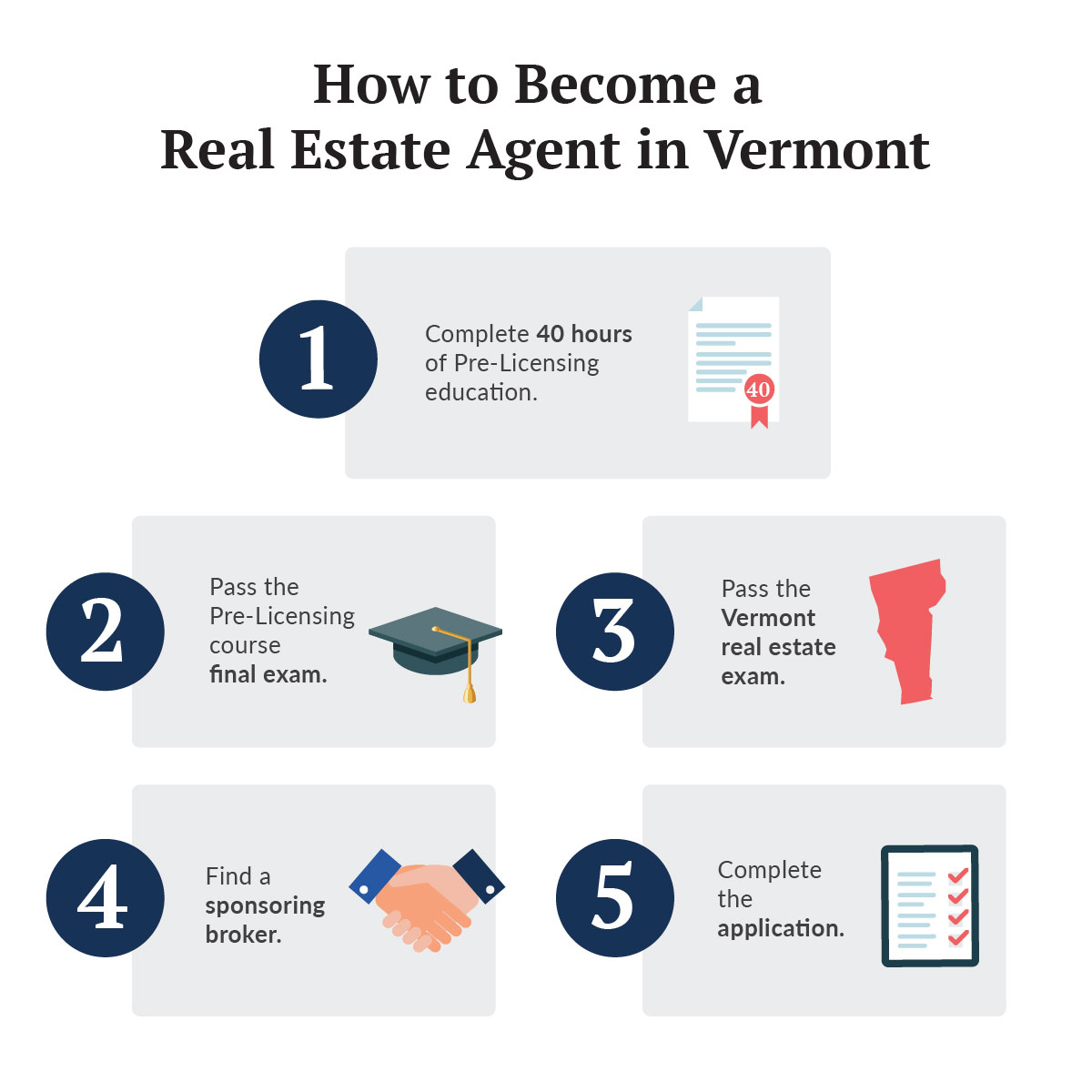Vermont Real Estate License Requirements
How to Become a Real Estate Agent in Vermont
Quick Overview:
You’ll need to be 18 years of age and have a high school diploma or GED
- Complete 40 Hours of Pre-Licensing Education
- Pass the Pre-Licensing Course Final Exam
- Pass the Vermont Real Estate Exam
- Find a Sponsoring Broker
- Complete the Application
How to Get a Real Estate License in Vermont
The Vermont Secretary of State requires all potential agents to complete the following steps in order to become a licensed real estate agent.
1. Complete 40 Hours of Pre-Licensing Education
Agents must successfully complete 40 hours of Pre-Licensing Education. There are several different Vermont real estate schools, many offer online classes as well as learning in-person coursework. Some Vermont real estate schools have an option for a Free Trial that can help determine if real estate courses are right for you. If you have a criminal background, you can apply for a pre-approval process through the Vermont Office of Professional Regulation (OPR) while the state reviews your case.
2. Pass the Pre-Licensing Course Final Exam
After you complete all the course materials, meet the minimum time requirement, and pass the practice exam, there is a course final exam. The minimum passing score is 75%.
3. Pass the Vermont Real Estate Examination
PSI administers the national portion of the Vermont real estate licensing exam. There are 100 questions on the national portion and 2.5 hours are allowed for the exam. The PSI candidate handbook provides more information about the national test.
The Vermont state licensing exam is administered by the Vermont Office of Professional Regulation (OPR). Initial online applications include the Vermont State Examination and it will be completed during the application process. The state portion is an untimed, open book, paper-based exam with 50 questions.
4. Find a Sponsoring Broker
To be licensed, you must first be associated with a current and active Vermont real estate Broker. Your sponsoring Broker also needs to complete this form. It’s important to find the right Broker to work with since this person will serve as your mentor as you start your new career in real estate.
5. Complete the Application
Once you’ve completed all the previous steps, you will be ready to complete the application process on the Vermont Office of Profession Regulation (OPR) website. The application process may be started at any time (even before steps 1-4 below), but only after completing all the previous steps can you successfully complete the application paperwork.
Upon submitting the application and providing payment, the OPR will run its final review before approving your licensure. If you have any questions, you can contact the Vermont real estate office at 802.828.1505.
Quick Facts:
-
You can use the Vermont Real Estate Agent License Lookup Tool to verify an agent’s license status.
-
The Vermont Office of Professional Regulation has laid out their statutes, rules, and resources.
-
Find all the applications and forms you need through OPR.
-
You can apply for or renew your license through the VT OPR portal.
Common Questions About Getting Your Vermont Real Estate License
1. How Much Does It Cost to Get Your Real Estate License in Vermont?
The cost of an agent license in VT can vary considerably depending on the price of your Vermont real estate classes and different types of fees for your licensing, etc. An individual can typically expect to pay $435-$635 to get an active Vermont real estate license.
| Average Course Tuition | $275-$475 |
| VT Real Estate Licensing Exam | $110 |
| Application Fee | $50 |
| Total | $435-$635 |
2. How Long Does It Take to Get a Real Estate License in Vermont?
The specific amount of time to complete your 40 hours of licensing can vary depending on how long each task takes you, and how long you take to complete your Pre-Licensing courses. Different credit hours and requirements of each brokerage will affect each Salesperson differently.
| Student Learning Pace | Time Period |
|---|---|
| Full-Time Student (40 hours a week) | 1 week |
| 20 Hours a Week | 2 weeks |
| 10 Hours a Week | 4 weeks |
| 5 Hours a Week | 8 weeks |
3. What Do I Need To Know About Reciprocity In Vermont?
If you get a real estate license in Kentucky, you are automatically eligible to work in states that offer full reciprocity. States that offer full reciprocity will recognize your Kentucky license, meaning you can work in their state after fulfilling significantly less requirements. Typically, this means passing the state-specific real estate exam or taking a state-specific course. States with full reciprocity include:
- Alabama
- Colorado
- Delaware
- Georgia
- Florida
- Kansas
- Kentucky
- Maine
- Mississippi
- Missouri
- Virginia
- Washington
The above list is not comprehensive. Please refer to
this guide for more information on reciprocity.
4. How Much Money Can I Make as a Vermont Real Estate Agent?
According to Indeed.com, the average salary for a Vermont real estate agent is $98,725. This number is 5% lower than the national average.
Vermont Real Estate Post Licensing Requirements
Vermont real estate Post-Licensing education requirements are that you complete eight hours of Post-Licensing education courses within the first 90 days of receiving your real estate license. You will need to make sure that you are getting these courses through an OPR-approved education provider.
Vermont Real Estate Continuing Education Requirements
All licensed agents are required to maintain their knowledge in their particular field, for real estate agents, this requirement is 16 hours of approved Continuing Education courses, to be completed by May 31st of every even-numbered year. These 16 hours consist of four mandatory hours and 12 elective hours. You will need to make sure that you are getting these courses through an OPR-approved education provider.



